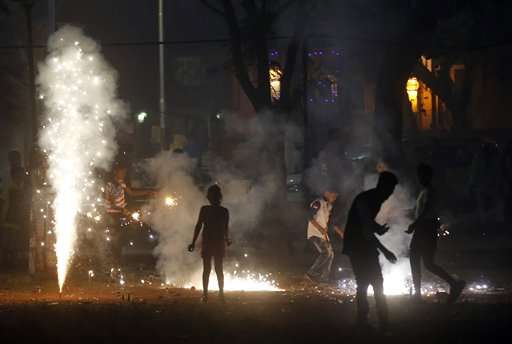The capital city of India already ranks among the world’s top most polluted cities, and the situations have gone worse in Delhi in the recent years with high rates of pollutants present in the atmosphere, resulting in difficulties in breathing, watery eyes and increased respiratory diseases among the residents.
Pollution bar raises 18 times during Diwali


During Diwali days, the air pollution in Delhi hits 18 times the normal healthy limit; creating the menace like situations with a thick layer of smog. Despite the Supreme Court order banning the sale of firecrackers, there is no difference in the level of pollution during the festival and the air quality is deteriorating with high intensity.
According to some of the environmental activists, the supreme court order was not enforced properly as the fireworks were still available for sale in most places and some people even bought them from the neighboring cities.
Affects the quality of air
The circumstance for air pollution in Delhi has gone wrong so adversely that the index of air quality crossed the dangerous limit of 350. Many at times, a public emergency declaration occurs in Delhi, and people choose to strictly stay indoors to avoid hazardous health effects.
Diwali is one of the most popular Hindu festivals in India. It is the festival of lights and love. However, as the tradition follows, people celebrate the same by bursting lots of firecrackers throughout the week. This practice has increased the level of pollution in Delhi. This occurs tremendously by amplified concentrations of ozone, nitrogen dioxide, and other hazardous gases.
The particles present in the bursting of these fireworks lodge directly into the lungs. This leads to chronic diseases.
Pollution level is breaching the emergency standard
An analysis by the Centre for Science and Environment (CSE) has revealed that despite the cracker ban, air pollution levels breached the emergency standards on Diwali night. But without the ban on the sale of firecrackers, the levels would have been far worse than expected. Calm breeze and enhanced moisture present in the air on the post-Diwali morning worsened the pollution in Delhi.
The government reports claim that Dehli NCR can’t be in public emergency mode at all times. This problem demands long-term strategies. We need effective policies to control the pollution in Delhi. The proper laws need to be implemented to draw a thin line. We should understand the difference between celebrating a festival and making the world toxic due to environmental degradation. A comprehensive plan needs to enforce in the capital of India. Then only it can sustain the balanced index level of the atmosphere.
